- Home
- Michael Connelly
The Black Ice Page 4
The Black Ice Read online
Page 4
"Book reports," she said, having noticed his gaze. "I assigned books to my students with the reports due before the Christmas vacation. It was going to be my first Christmas alone and I guess I wanted to make sure I had something to keep me busy."
Bosch nodded. He looked around the rest of the room. In his job, he learned a lot about people from their rooms, the way they lived. Often the people could no longer tell him themselves. So he learned from his observations and believed that he was good at it.
The room in which they sat was spare. Not much furniture. It didn't look like a lot of entertaining of friends or family happened here. There was a large bookshelf at one end of the room that was filled by hardback novels and oversized art books. No TV. No sign of children. It was a place for quiet work or fireside talks.
But no more.
In the corner opposite the fireplace was a five-foot Christmas tree with white lights and red balls, a few homemade ornaments that looked as if they might have been passed down through generations. He liked the idea that she had put up the tree by herself. She had continued her life and its routines amidst the ruins of her marriage. She had put the tree up for herself. It made him feel her strength. She had a hard shell of hurt and maybe loneliness but there was a sense of strength, too. The tree said she was the kind of woman who would survive this, would make it through. On her own. He wished he could remember her name.
"Before you start," she said, "can I ask you something?"
The light from the reading lamp next to her chair was low wattage but he could clearly see the intensity of her brown eyes.
"Sure."
"Did you do that on purpose? Let the reporters come up here first so you wouldn't have to do the dirty work? That's what my husband used to call it. Telling families. He called it the dirty work and he said the detectives always tried to get out of it."
Bosch felt his face grow warm. There was a clock on the fireplace mantel that now seemed to be ticking very loudly in the silence. He finally managed to say, "I was told only a short time ago to come here. I had a little trouble finding it. I—"
He stopped. She knew.
"I'm sorry. I guess you're right. I took my time."
"It's okay. I shouldn't put you on the spot. It must be a terrible job."
Bosch wished he had a fedora like the ones the detectives in the old movies always had; that way he could hold it in his hands and fiddle with it and let his fingers trace its brim, give him something to do. He looked at her closely now and saw the quality of damaged beauty about her. Mid-thirties, he guessed, with brown hair and blonde highlights, she seemed agile, like a runner. Clearly defined jawline above the taut muscles of her neck. She had not used makeup to try to hide the lightly etched lines that curved under her eyes. She wore blue jeans and a baggy white sweatshirt that he thought might have been her husband's once. Bosch wondered how much of Calexico Moore she still carried in her heart.
Harry actually admired her for taking the shot at him about the dirty work. He knew he deserved it. In the three minutes he had known her he thought she reminded him of someone but he wasn't sure who. Someone from his past maybe. There was a quiet tenderness there beside her strength. He kept bringing his eyes back to hers. They were magnets.
"Anyway, I'm Detective Harry Bosch," he began again, hoping she might introduce herself.
"Yes, I've heard of you. I remember the newspaper articles. And I'm sure my husband spoke of you—I think it was when they sent you out to Hollywood Division. Couple years ago. He said before that one of the studios had paid you a lot of money to use your name and do a TV movie about a case. He said you bought one of those houses on stilts up in the hills."
Bosch nodded reluctantly and changed the subject.
"I don't know what the reporters told you, Mrs. Moore, but I have been sent out to tell you that it appears your husband has been found and he is dead. I am sorry to have had to tell you this. I—"
"I knew and you knew and every cop in town knew it would come to this. I didn't talk to the reporters. I didn't need to. I told them no comment. When that many of them come to your house on Christmas night, you know it's because of bad news."
He nodded and looked down at the imaginary hat in his hands.
"So, are you going to tell me? Was it an official suicide? Did he use a gun?"
Bosch nodded and said, "It looks like it but nothing is definite un—"
"Until the autopsy. I know, I know. I'm a cop's wife. Was, I mean. I know what you can say and can't say. You people can't even be straight with me. Until then there are always secrets to keep to yourselves."
He saw the hard edge enter her eyes, the anger.
"That's not true, Mrs. Moore. I'm just trying to soften the im—"
"Detective Bosch, if you want to tell me something, just tell me."
"Yes, Mrs. Moore, it was with a gun. If you want the details, I can give you the details. Your husband, if it was your husband, took his face off with a shotgun. Gone completely. So, we have to make sure it was him and we have to make sure he did it himself, before we can say anything for sure. We are not trying to keep secrets. We just don't have all the answers yet."
She leaned back in her chair, away from light. In the veil of shadows Bosch saw the look on her face. The hardness and anger in her eyes had softened. Her shoulders seemed to untighten. He felt ashamed.
"I'm sorry," he said. "I don't know why I told you that. I should have just—"
"That's okay. I guess I deserved it. . . . I apologize, too."
She looked at him then without anger in her eyes. He had broken through the shell. He could see that she needed to be with someone. The house was too big and too dark to be alone in right now. All the Christmas trees and book reports in the world couldn't change that. But there was more than that making Bosch want to stay. He found that he was instinctively attracted to her. For Bosch it had never been an attraction of an opposite but the reverse of that myth. He had always seen something of himself in the women who attracted him. Why it was this way, he never understood. It was just there. And now this woman whose name he didn't even know was there and he was being drawn to her. Maybe it was a reflection of himself and his own needs, but it was there and he had seen it. It hooked him and made him want to know what had etched the circles beneath such sharp eyes. Like himself, he knew, she carried her scars on the inside, buried deep, each one a mystery. She was like him. He knew.
"I'm sorry but I don't know your name. The deputy chief just gave me the address and said go."
She smiled at his predicament.
"It's Sylvia."
He nodded.
"Sylvia. Um, is that coffee I smell by any chance?"
"Yes. Would you like a cup?"
"That would be great, if it's not too much trouble."
"Not at all."
She got up and as she passed in front of him so did his doubts.
"Listen, I'm sorry. Maybe I should go. You have a lot to think about and I'm intruding here. I've—"
"Please stay. I could use the company."
She didn't wait for an answer. The fire made a popping sound as the flames found the last pocket of air. He watched her head toward the kitchen. He waited a beat, took another look around the room and stood up and headed toward the lighted doorway of the kitchen.
"Black is fine."
"Of course. You're a cop."
"You don't like them much, do you. Cops."
"Well, let's just say I don't have a very good record with them."
Her back was to him and she put two mugs on the counter and poured coffee from a glass pot. He leaned against the doorway next to the refrigerator. He was unsure what to say, whether to press on with business or not.
"You have a nice home."
"No. It's a nice house, not a home. We're selling it. I guess I should say I'm selling it now."
She still hadn't turned around.
"You know you can't blame yourself for whatever he did."
It
was a meager offering and he knew it.
"Easier said than done."
"Yeah."
There was a long moment of silence then before Bosch decided to get on with it.
"There was a note."
She stopped what she was doing but still did not turn.
" 'I found out who I was.' That's all he said."
She didn't say anything. One of the mugs was still empty.
"Does it mean anything to you?"
She finally turned to him. In the bright kitchen light, he could see the salty tracks that tears had left on her face. It made him feel inadequate, that he was nothing and could do nothing to help heal her.
"I don't know. My husband . . . he was caught on the past."
"What do you mean?"
"He was just—he was always going back. He liked the past better than the present or the hope of the future. He liked to go back to the time he was growing up. He liked . . . He couldn't let things go."
He watched tears slide into the grooves below her eyes. She turned back to the counter and finished pouring the coffee.
"What happened to him?" he asked.
"What happens to anybody?" For a while after that she didn't speak, then said, "I don't know. He wanted to go back. He had a need for something back there."
Everybody has a need for their past, Bosch thought. Sometimes it pulls harder on you than the future. She dried her eyes with tissue and then turned and gave him a mug. He sipped it before speaking.
"Once he told me he lived in a castle," she said. "That's what he called it, at least."
"In Calexico?" he asked.
"Yes, but it was for a short while. I don't know what happened. He never told me a lot about that part of his life. It was his father. At some point, he wasn't wanted anymore by his father. He and his mother had to leave Calexico—the castle, or whatever it was—and she took him back across the border with her. He liked to say he was from Calexico but he really grew up in Mexicali. I don't know if you've ever been there."
"Just to drive through. Never stopped."
"That's the general idea. Don't stop. But he grew up there."
She stopped and he waited her out. She was looking down at her coffee, an attractive woman who looked weary of this. She had not yet seen that this was a beginning for her as well as an end.
"It was something he never got over. The abandonment. He often went back there to Calexico. I didn't go but I know he did. Alone. I think he was watching his father. Maybe seeing what could have been. I don't know. He kept pictures from when he was growing up. Sometimes at night when he thought I was asleep, he'd take them out and look at them."
"Is he still alive, the father?"
She handed him a mug of coffee.
"I don't know. He rarely spoke of his father and when he did he said his father was dead. But I don't know if that was metaphorically dead or that he actually was dead. He was dead as far as Cal went. That was what mattered. It was a very private thing with Cal. He still felt the rejection, all these years later. I could not get him to talk about it. Or, when he would, he would just lie, say the old man meant nothing and that he didn't care. But he did. I could tell. After a while, after years, I have to say that I stopped trying to talk with him about it. And he would never bring it up. He'd just go down there—sometimes for a weekend, sometimes a day. He'd never talk about it when he came back."
"Do you have the photos?"
"No, he took them when he left. He'd never leave them."
Bosch sipped some coffee to give himself time to think.
"It seems," he began, "I don't know, it seems like . . . could this have had anything to do with . . ."
"I don't know. All I can tell you is that it had a lot to do with us. It was an obsession with him. It was more important to him than me. It's what ended it for us."
"What was he trying to find?"
"I don't know. In the last few years he shut me out. And I have to say that after a while I shut him out. That's how it ended."
Bosch nodded and looked away from her eyes. What else could he do? Sometimes his job took him too far inside people's lives and all he could do was stand there and nod. He was asking questions he felt guilty asking because he had no right to the answers. He was just the messenger boy here. He wasn't supposed to find out why somebody would hold a double-barrel shotgun up to his face and pull the triggers.
Still, the mystery of Cal Moore and the pain on her face wouldn't let him go. She was captivating in a way that went beyond her physical beauty. She was attractive, yes, but the hurt in her face, the tears and yet the strength in her eyes tugged at him. The thought that occurred to him was that she did not deserve this. How could Cal Moore have fucked up so badly?
He looked back at her.
"There was another thing he told me once. Uh, I've had some experience with IAD, uh, that's Internal—"
"I know what it is."
"Yes, well, he asked me for some advice. Asked me about if I knew somebody that was asking questions about him. Name of Chastain. Did Cal tell you about this? What it was about?"
"No, he didn't."
Her demeanor was changing. Bosch could actually see the anger welling up from inside again. Her eyes were very sharp. He had struck a nerve.
"But you knew about it, right?"
"Chastain came here once. He thought I would cooperate with whatever it was he was doing. He said I made a complaint about my husband, which was a lie. He wanted to go through the house and I told him to leave. I don't want to talk about this."
"When did Chastain come?"
"I don't know. Couple months ago."
"You warned Cal?"
She hesitated and then nodded.
Then Cal came to the Catalina and asked me for advice, Harry realized.
"You sure you don't know what it was about?"
"We were separated by then. We didn't talk. It was over between us. All I did was tell Cal that this man had come and that he had lied about who made the complaint. Cal said that was all they do. Lie. He said don't worry about it."
Harry finished his coffee but held the mug in his hand. She had known her husband had somehow fallen, had betrayed their future with his past, but she had stayed loyal. She had warned him about Chastain. Bosch couldn't fault her for that. He could only like her better.
"What are you doing here?" she asked.
"What?"
"If you are investigating my husband's death, I would assume you already know about IAD. You are either lying to me, too, or don't know. If that's the case, what are you doing here?"
He put the mug down on the counter. It gave him a few extra seconds.
"I was sent out by the assistant chief to tell you what was—"
"The dirty work."
"Right. I got stuck with the dirty work. But like I said, I sort of knew your husband and . . ."
"I don't think it's a mystery you can solve, Detective Bosch."
He nodded—the old standby.
"I teach English and Lit at Grant High in the Valley," she said. "I assign my students a lot of books written about L.A. so they can get a feel for the history and character of their community. Lord knows, few of them were born here. Anyway, one of the books I assign is The Long Goodbye. It's about a detective."
"I've read it."
"There is a line. I know it by heart. 'There is no trap so deadly as the trap you set for yourself.' Whenever I read that I think of my husband. And me."
She started to cry again. Silently, never taking her eyes off Bosch. This time he didn't nod. He saw the need in her eyes and crossed the room and put his hand on her shoulder. It felt awkward, but then she moved into him and leaned her head against his chest. He let her keep crying until she pulled away.
An hour later, Bosch was home. He picked up the half-filled glass of wine and the bottle that had been sitting on the table since dinner. He went out on the back porch and sat and drank and thought about things until early into the morning hours. The gl
ow of the fire across the pass was gone. But now something burned within himself.
Calexico Moore had apparently answered a question that all people carry deep within themselves—that Harry Bosch, too, had longed to answer. I found out who I was.
And it had killed him. It was a thought that pushed a fist into Bosch's guts, into the most secret folds of his heart.
Five
THURSDAY, THE MORNING AFTER CHRISTMAS, was one of those days the postcard photographers pray for. There was no hint of smog in the sky. The fire in the hills had burned out and the smoke had long been blown over the hills by Pacific breezes. In its stead the Los Angeles basin basked under a blue sky and puffy cumulus clouds.
Bosch decided to take the long way down out of the hills, driving on Woodrow Wilson until it crossed Mulholland and then taking the winding route through Nichols Canyon. He loved the views of the hills covered with blue wisteria and violet ice plants, topped with aging million-dollar homes that gave the city its aura of fading glory. As he drove he thought of the night before and how it had made him feel to comfort Sylvia Moore. It made him feel like a cop in a Rockwell painting. Like he had made a difference.
Once he was out of the hills he took Genesee to Sunset and then cut over to Wilcox. He parked behind the station and walked past the fenced windows of the drunk tank into the detective bureau. The gloom in the squad room was thicker than cigarette smoke in a porno theater. The other detectives sat at their tables with their heads down, most talking quietly on the phone or with their faces buried in the paperwork that haunted their lives with its never-ceasing flow.
Harry sat down at the homicide table and looked across at Jerry Edgar, his some-of-the-time partner. There were no permanently assigned partners anymore. The bureau was shorthanded and there was a departmental hiring and promotion freeze because of budget cuts. They were down to five detectives on the homicide table. The bureau commander, Lieutenant Harvey "Ninety-eight" Pounds, managed this by working detectives solo except on key cases, dangerous assignments or when making arrests. Bosch liked working on his own, anyway, but most of the other detectives complained about it.

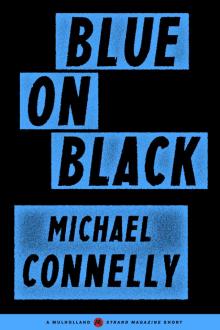 Blue on Black
Blue on Black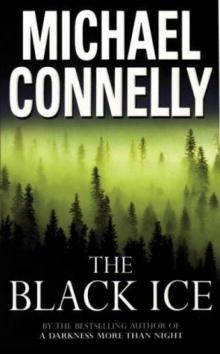 The Black Ice (1993)
The Black Ice (1993) Crime Beat: A Decade of Covering Cops and Killers
Crime Beat: A Decade of Covering Cops and Killers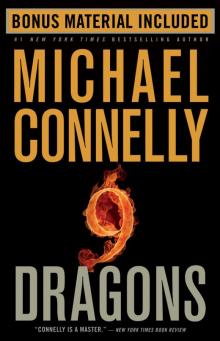 Nine Dragons
Nine Dragons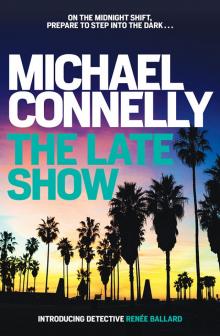 The Late Show
The Late Show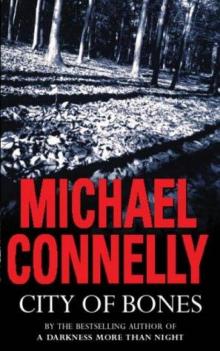 City of Bones
City of Bones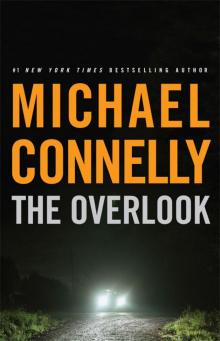 The Overlook
The Overlook The Crossing
The Crossing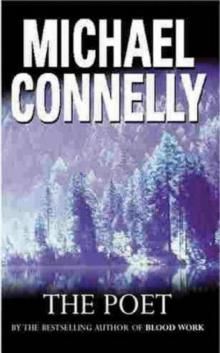 The Poet (1995)
The Poet (1995)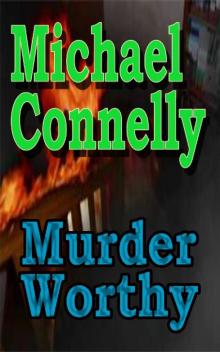 Murder Worthy
Murder Worthy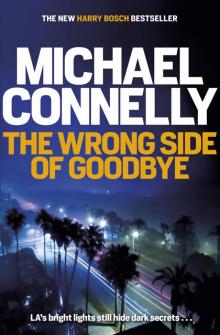 The Wrong Side of Goodbye
The Wrong Side of Goodbye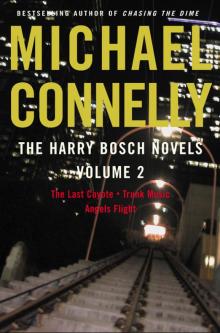 Harry Bosch Novels, The: Volume 2
Harry Bosch Novels, The: Volume 2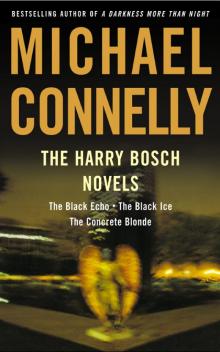 The Harry Bosch Novels
The Harry Bosch Novels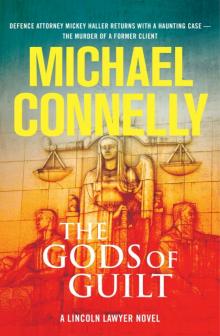 The Gods of Guilt
The Gods of Guilt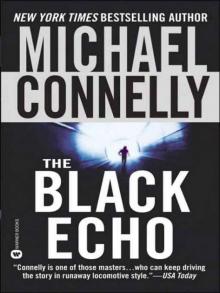 The Black Echo
The Black Echo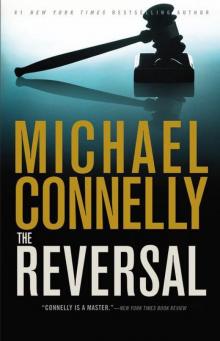 The Reversal
The Reversal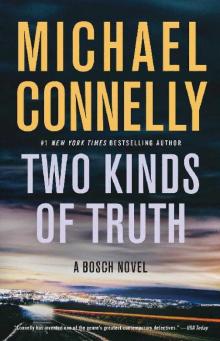 Two Kinds of Truth
Two Kinds of Truth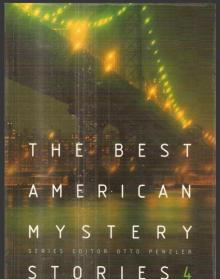 The Best American Mystery Stories 2003
The Best American Mystery Stories 2003 The Rag
The Rag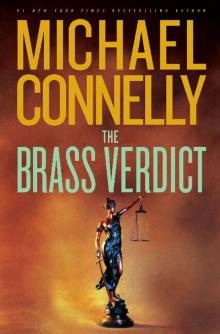 The Brass Verdict
The Brass Verdict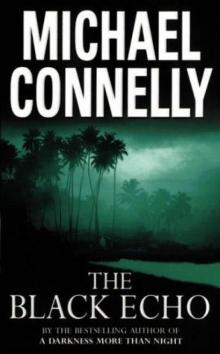 The Black Echo (1992)
The Black Echo (1992)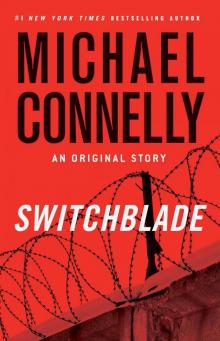 Switchblade
Switchblade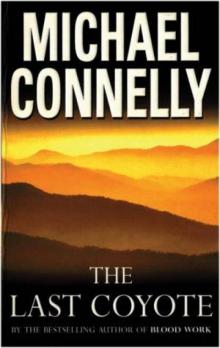 The Last Coyote
The Last Coyote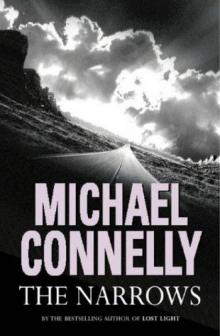 The Narrows
The Narrows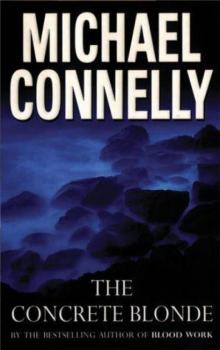 The Concrete Blonde (1994)
The Concrete Blonde (1994)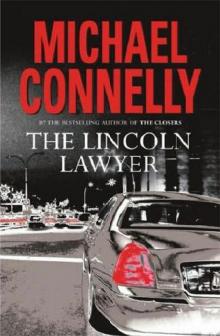 THE LINCOLN LAWYER (2005)
THE LINCOLN LAWYER (2005)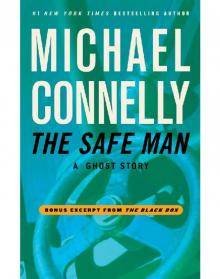 The Safe Man: A Ghost Story
The Safe Man: A Ghost Story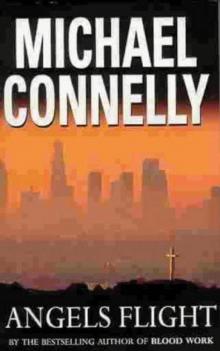 Angels Flight (1998)
Angels Flight (1998) Void Moon
Void Moon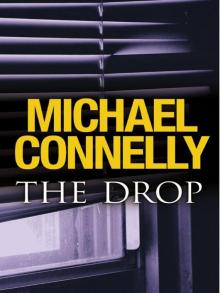 The Drop
The Drop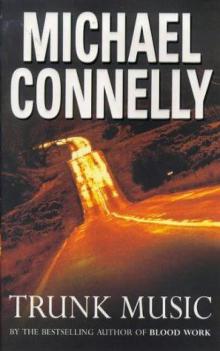 Trunk Music
Trunk Music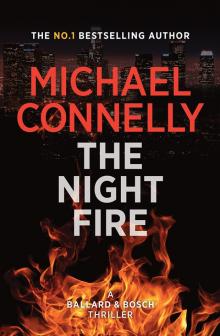 The Night Fire
The Night Fire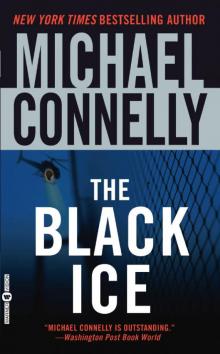 The Black Ice
The Black Ice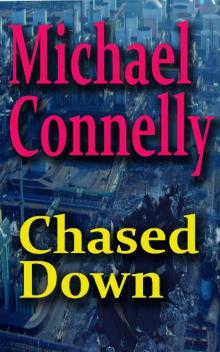 Chased Down
Chased Down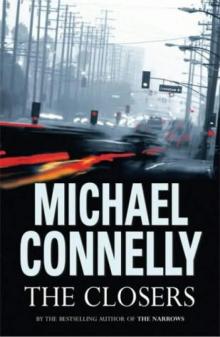 The Closers
The Closers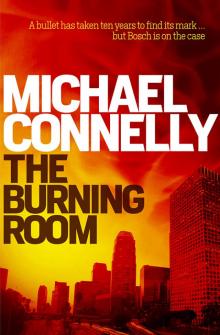 The Burning Room
The Burning Room Angels Flight
Angels Flight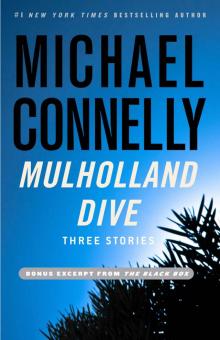 SSC (2012) Mulholland Drive
SSC (2012) Mulholland Drive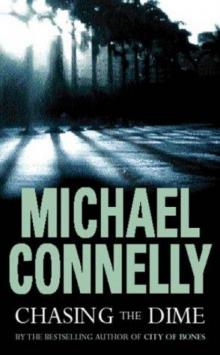 Chasing the Dime
Chasing the Dime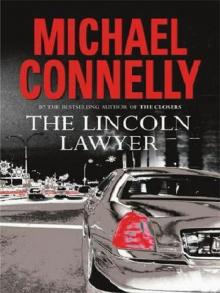 The Lincoln Lawyer
The Lincoln Lawyer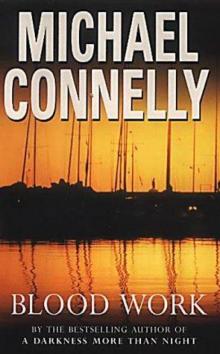 Blood Work (1998)
Blood Work (1998)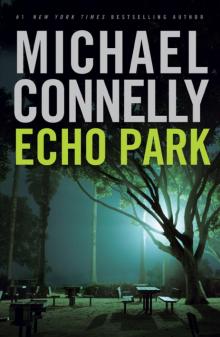 Echo Park
Echo Park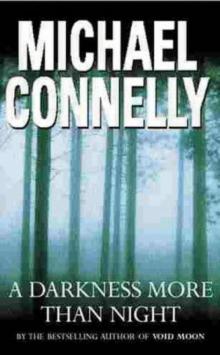 A Darkness More Than Night
A Darkness More Than Night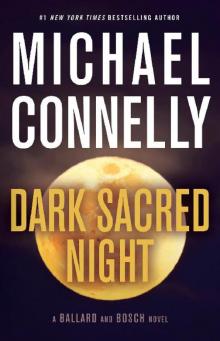 Dark Sacred Night - Ballard and Bosch #1;Renée Ballard #2
Dark Sacred Night - Ballard and Bosch #1;Renée Ballard #2 Lost Light
Lost Light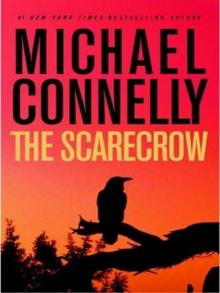 The Scarecrow
The Scarecrow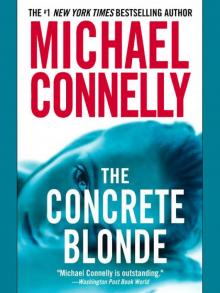 The Concrete Blonde
The Concrete Blonde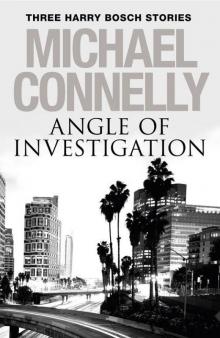 Angle of Investigation
Angle of Investigation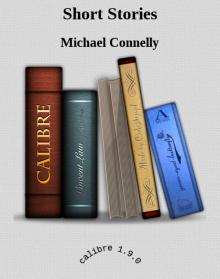 Suicide Run: Three Harry Bosch Stories
Suicide Run: Three Harry Bosch Stories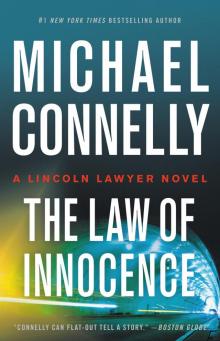 The Law of Innocence
The Law of Innocence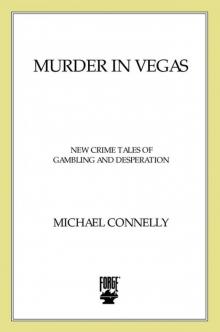 Murder in Vegas: New Crime Tales of Gambling and Desperation
Murder in Vegas: New Crime Tales of Gambling and Desperation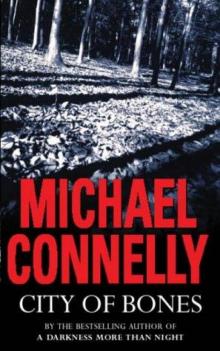 City Of Bones (2002)
City Of Bones (2002)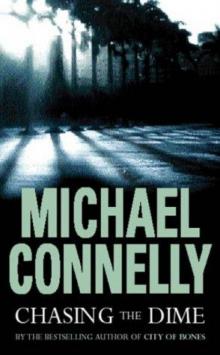 Chasing the Dime (2002)
Chasing the Dime (2002)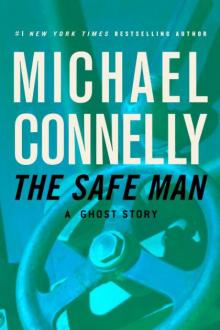 The Safe Man
The Safe Man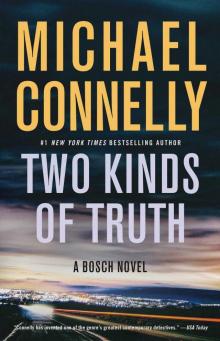 Two Kinds of Truth (A Harry Bosch Novel)
Two Kinds of Truth (A Harry Bosch Novel)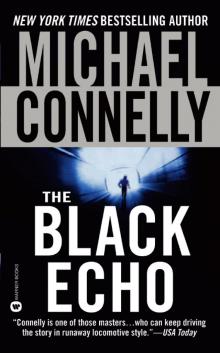 Harry Bosch 01 - The Black Echo
Harry Bosch 01 - The Black Echo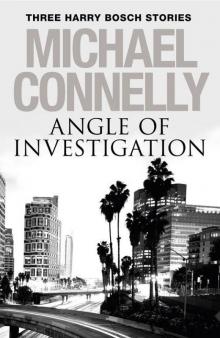 Angle of Investigation: Three Harry Bosch Short Stories
Angle of Investigation: Three Harry Bosch Short Stories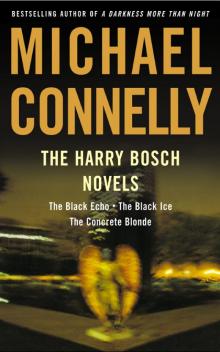 The Harry Bosch Novels Box Set 1
The Harry Bosch Novels Box Set 1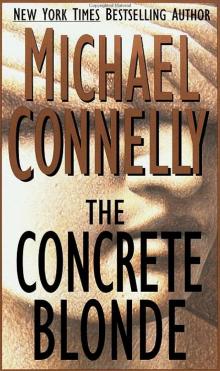 The Concrete Blonde hb-3
The Concrete Blonde hb-3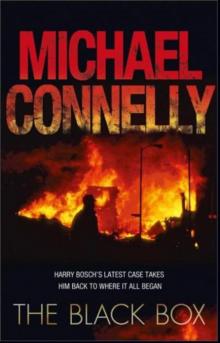 The Black Box hb-18
The Black Box hb-18 Short Stories
Short Stories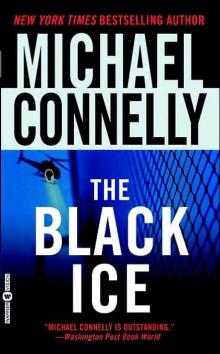 The Black Ice hb-2
The Black Ice hb-2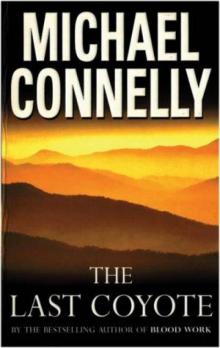 The Last Coyote (1995)
The Last Coyote (1995)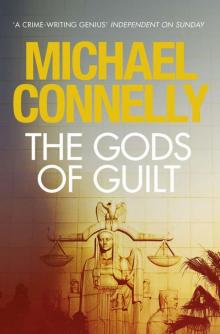 The Gods of Guilt mh-5
The Gods of Guilt mh-5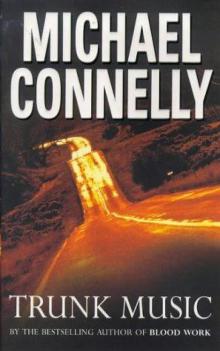 Trunk Music (1996)
Trunk Music (1996)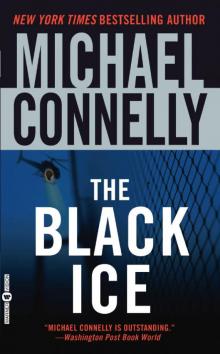 Harry Bosch 02 - The Black Ice
Harry Bosch 02 - The Black Ice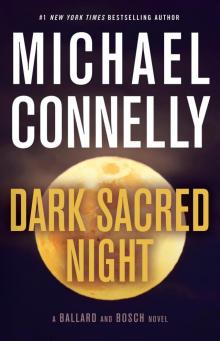 Dark Sacred Night
Dark Sacred Night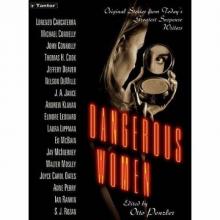 Cielo Azul
Cielo Azul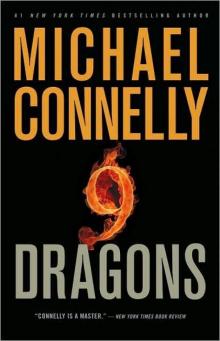 9 Dragons
9 Dragons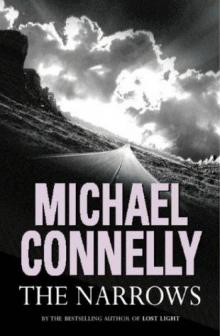 The Narrows (2004)
The Narrows (2004)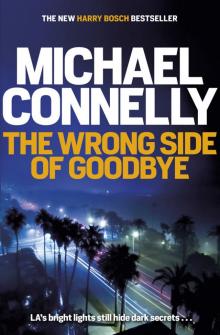 The Wrong Side of Goodbye (Harry Bosch Series)
The Wrong Side of Goodbye (Harry Bosch Series)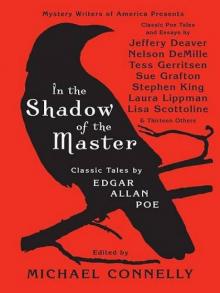 In The Shadow Of The Master: Classic Tales by Edgar Allan Poe
In The Shadow Of The Master: Classic Tales by Edgar Allan Poe Void Moon (1999)
Void Moon (1999)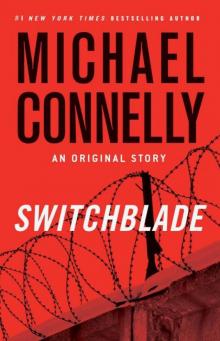 Switchblade: An Original Story (harry bosch)
Switchblade: An Original Story (harry bosch)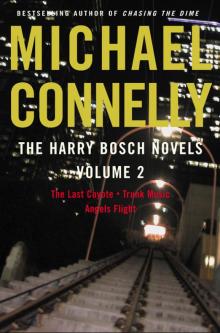 The Harry Bosch Novels, Volume 2
The Harry Bosch Novels, Volume 2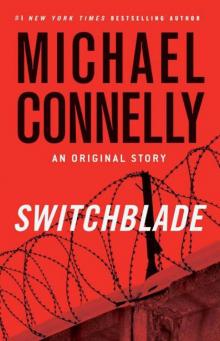 Switchblade: An Original Story
Switchblade: An Original Story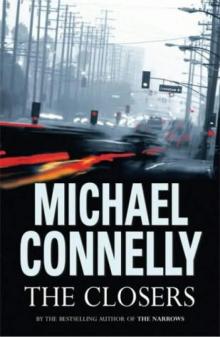 The Closers (2005)
The Closers (2005) Crime Beat
Crime Beat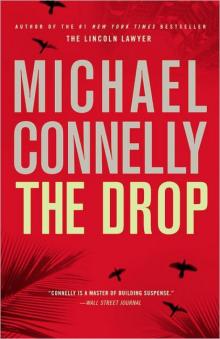 The Drop hb-17
The Drop hb-17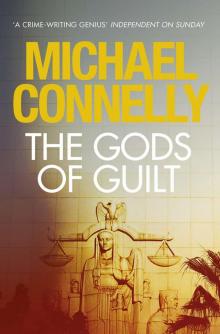 The Gods of Guilt (Mickey Haller 5)
The Gods of Guilt (Mickey Haller 5)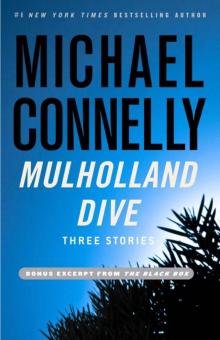 Mulholland Dive: Three Stories
Mulholland Dive: Three Stories Lost Light (2003)
Lost Light (2003)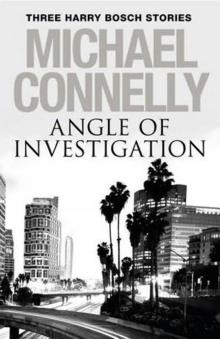 Angle of Investigation: Three Harry Bosch Stories
Angle of Investigation: Three Harry Bosch Stories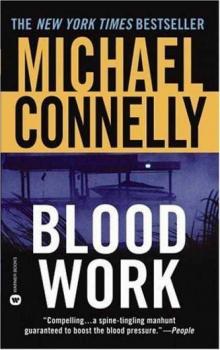 Blood Work
Blood Work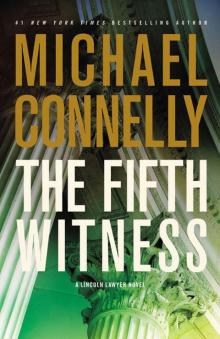 The Fifth Witness: A Novel
The Fifth Witness: A Novel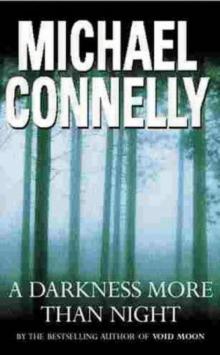 A Darkness More Than Night (2000)
A Darkness More Than Night (2000)